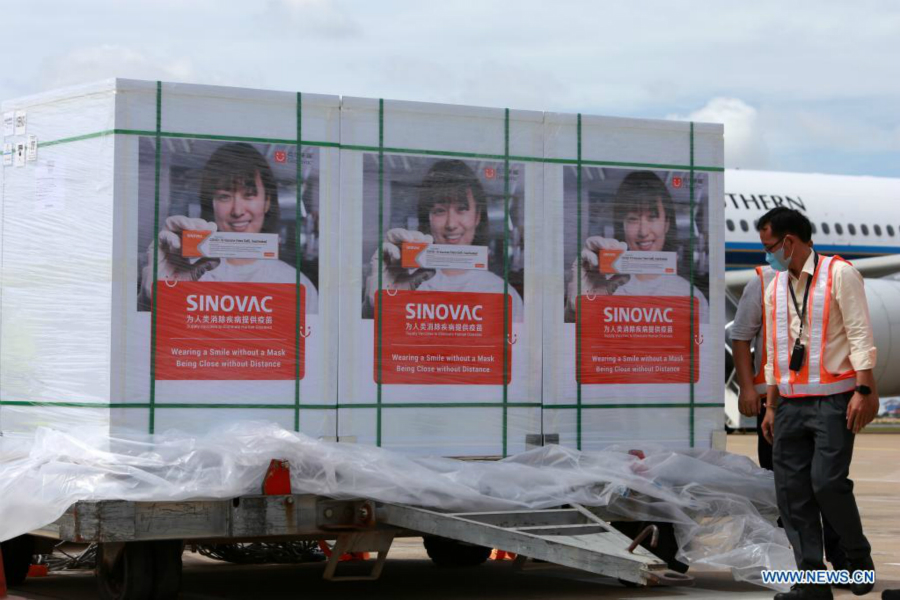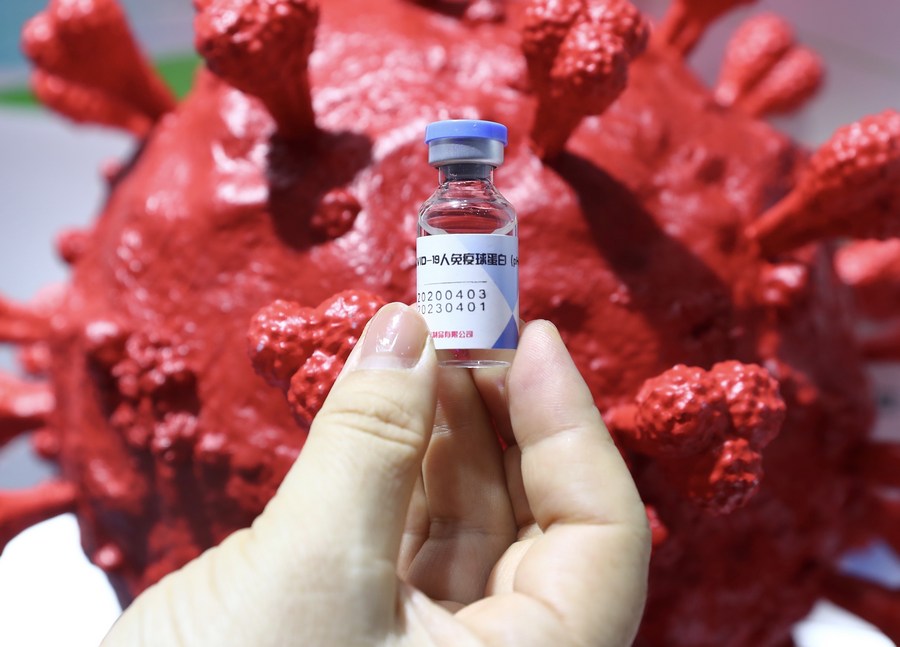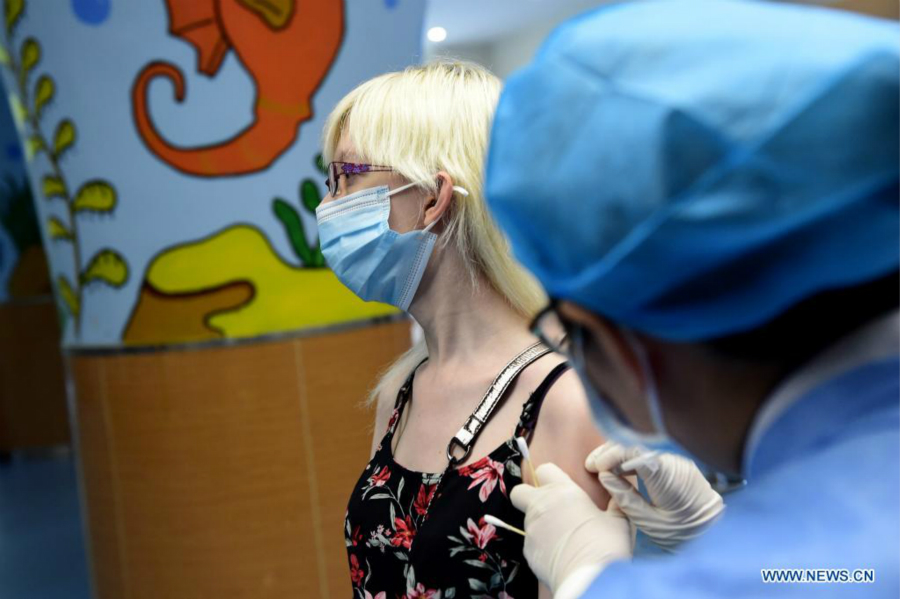China fulfills its promise to make COVID-19 vaccine a global public good
China has provided more than 700 million doses of COVID-19 vaccines and concentrates to countries across the world, according to the latest data from China's Joint Prevention and Control Mechanism of the State Council. So far, China has donated and exported more doses than all other nations combined.
China has been calling for closer international cooperation on vaccines to ensure that they are both accessible and affordable in developing countries and that they become a global public good. Despite its own huge population and tight vaccine supply, China has actively responded to other nations' requests for vaccine cooperation, injecting confidence and strength into the global fight against the pandemic.

A batch of China's Sinovac COVID-19 vaccines arrives at the Phnom Penh International Airport in Phnom Penh, Cambodia, July 31, 2021. A plane carrying a new batch of Sinovac COVID-19 vaccine landed in Phnom Penh, capital of Cambodia, on Saturday, giving another boost to the country in its vaccination drive. [Xinhua/Ly Lay]
All-out effort to vaccinate the world
Recently, the Global Alliance for Vaccines and Immunization announced that it had signed advance purchase agreements with two Chinese pharmaceutical companies – Sinopharm and Sinovac (both of their respective vaccines have already been included in the WHO's Emergency Use Listing after thorough reviews by WHO's Strategic Advisory Group of Experts on Immunization (SAGE)). The move signifies that the two companies will provide vaccines to the COVID-19 Vaccines Global Access (COVAX) program, making a greater contribution to anti-pandemic efforts in developing countries.
With a growing number of people receiving Chinese vaccines worldwide, more and more data has validated the safety and efficacy of the Chinese vaccines.
For many developing nations, Chinese vaccines have been perceived as a "timely rain", since those initial doses have been the first batches of vaccines they were able to obtain. Teodoro Obiang Nguema Mbasogo, President of Equatorial Guinea, has pointed out that the Chinese vaccines have brought hope for the country's fight against the epidemic. President Emmerson Mnangagwa of Zimbabwe has highlighted that the vaccines donated by China are like a light at the end of the tunnel. "Without assistance from China," said Prime Minister of Cambodia Hun Sen, "maybe we will not have vaccines for nearly 2 million Cambodian people," he further claimed, at the 26th International Conference on the Future of Asia.
World heads of state and senior government officials have taken the lead in receiving and casting their votes of confidence in Chinese vaccines. Among them, Indonesian President Joko Widodo and Turkish President Recep Tayyip Erdogan got their vaccine jabs live on television; Philippine President Rodrigo Duterte said he felt pretty good after the vaccination; while Salman, Crown Prince of Bahrain, participated in Sinopharm's Phase III international clinical trial for the company's inactivated vaccine as a volunteer and received one of its very first doses.
On January 29, the Hungarian government sealed a deal with Sinopharm to purchase 5 million doses of vaccines from the company, making it the first member country of the European Union to approve China's Sinopharm COVID-19 vaccine. Peter Szijjarto, Hungarian Minister of Foreign Affairs and Trade, believed that the Hungarian government had made the right decision to join hands with Sinopharm, as he pointed out that vaccines are not a geopolitical issue, but a life-saving tool. "We would like to thank China for providing several batches of vaccines timely or even ahead of schedule to protect the lives of one million Hungarian people, despite China's own tight demand. We will never forget it," the Hungarian minister said during a meeting with State Councilor and Foreign Minister Wang Yi on May 31, 2021.
At the handover ceremony of Chinese-donated vaccines, Gaston Browne, prime minister of Antigua and Barbuda, spoke highly of China's vaccine assistance, highlighting that China has always taken the initiative in aiding and supporting developing countries, which has become ever more precious "when certain nations are still hoarding vaccines".
Indeed, Chinese vaccines have gained a good reputation in the international community with their safety and efficacy being widely recognized. Maria Rene Castro, Deputy Minister of Health for Bolivia, was convinced that the Sinopharm vaccines can help Bolivia to effectively build an "immunity barrier" in the border area.

A staff shows anti-COVID-19 human immunoglobulin at the booth of Sinopharm in the special area for public health and epidemic prevention during the 2020 China International Fair for Trade in Services (CIFTIS) in Beijing, capital of China, on Sept. 5, 2020. [Xinhua photo]
Commitment to vaccine production cooperation
In addition to vaccine assistance and exports, China has also carried out joint research and development as well as the joint production of COVID-19 vaccines together with developing countries, including the UAE, Egypt, Indonesia, Turkey, and Brazil, and has supported companies in cooperating with their foreign counterparts to carry out phase III clinical trials. With this support, the production capacity of these nations has expanded to 200 million doses, providing a strong impetus in the global fight against the pandemic.
This February, the Butantan Institute, a Brazilian biologic research center, carried out a mass vaccination trial in Serrana, São Paulo. Data from the mass trial showed that, after most residents received two doses of vaccines developed by Sinovac, symptomatic cases were reduced by 80% and hospitalizations dropped by 86% while deaths plunged by as much as 95%. Data also showed that cases among those residents otherwise ineligible for the vaccine, due to their being under 18 years old or pregnant, had also declined.
A new factory linked to the Butantan Institute to produce COVID-19 vaccines was jointly developed with Sinovac and has been under construction since last November, according to O Globo, an influential newspaper in Brazil, which is expected to be fully completed this October. Sinovac will dispatch a group of experts to Brazil to provide technical support to the new factory.
On March 28, 2021, an online launch ceremony for a China-UAE cooperative project on COVID-19 vaccine production was held in the capital cities of the two countries and north China's Hebei Province, simultaneously. The project, which consists of three filling lines and five packaging lines, aimed to help the UAE to manufacture its first batch of vaccines named Hayat-Vax (Hayat meaning "life" in Arabic).
In recent days, Egyptian Prime Minister Mostafa Madbouly announced that Egypt had completed a production run for its first batch of 1 million doses of the Sinovac vaccines. Madbouly stressed that COVID-19 vaccines are currently in short supply globally, and therefore, local production of the vaccines is very important to Egypt.
Last month, Sinopharm and Morocco signed a memorandum of understanding for cooperation in vaccine filling and production. Working together, the two sides will not only step up efforts in local epidemic control but will also dedicate themselves to serving the entire African continent.

A medical worker learns about a foreigner's medical history before vaccination at a vaccination site in Hefei, capital of east China's Anhui Province, May 12, 2021. Anhui has recently started COVID-19 vaccination for foreign nationals in the province. Foreign nationals of appropriate age, following the principle of voluntary participation, giving informed consent and assuming personal responsibility for risk, take the COVID-19 vaccine. [Xinhua/Huang Bohan]
Vaccinating foreigners in China
In order to optimize the immunity barrier, protect the health of foreigners in China, and safeguard their work, studies and life in the country, China has included foreigners within the eligible age group in its nationwide vaccination drive. So far, more than 350,000 foreigners have received a combination of over 600,000 doses of vaccines in China.
On April 9, Peking University launched its vaccination campaign for Chinese and foreign faculty members and students. Through multi-department collaboration, nearly 1,250 Chinese and foreign teachers and students received doses on that day. Mendu, a student from Cameroon, was confident in the reliability of Chinese vaccines. He hoped that with his vaccination, increasingly more people would join in the common endeavor for epidemic prevention and control.
The tremendous efforts made by the Chinese government and medical staff in the vaccination drive have warmed the hearts of many foreigners. A few days ago, a Shanghai delivery guy posted a short video on social media showing a special order he had received: drinks ordered by a German guy living in Shanghai named Frank that was sent to a community health center. On the receipt, Frank left a note, which read, "I am very grateful that I could get the COVID-19 vaccine in China, please send these drinks to the medical staff there."
Muhammad Sultan Irshad, a Pakistani student at Hubei University, had served as a volunteer during the period of epidemic prevention and control in Wuhan back in 2020. His work involved distributing masks to his classmates, providing mental health support, and even cooking for foreign students. This March, he became one of the first 12 foreign students on the school's campus who volunteered to get vaccinated. In the past few months, Sultan has worked on sharing China's anti-epidemic measures and economic progress through original video clips and articles in a bid to refute misinformation. "China's great efforts have made a huge contribution to the world's fight against the pandemic," Sultan said.
























